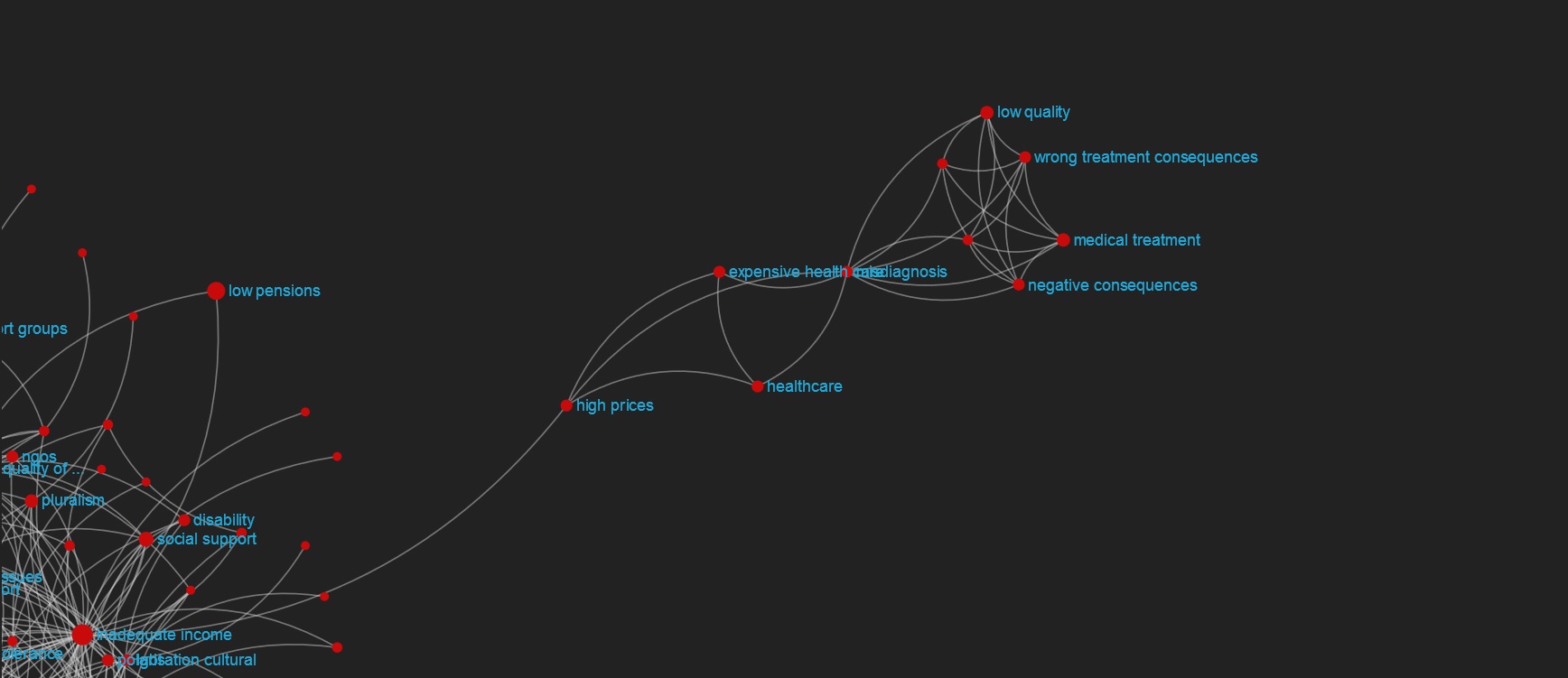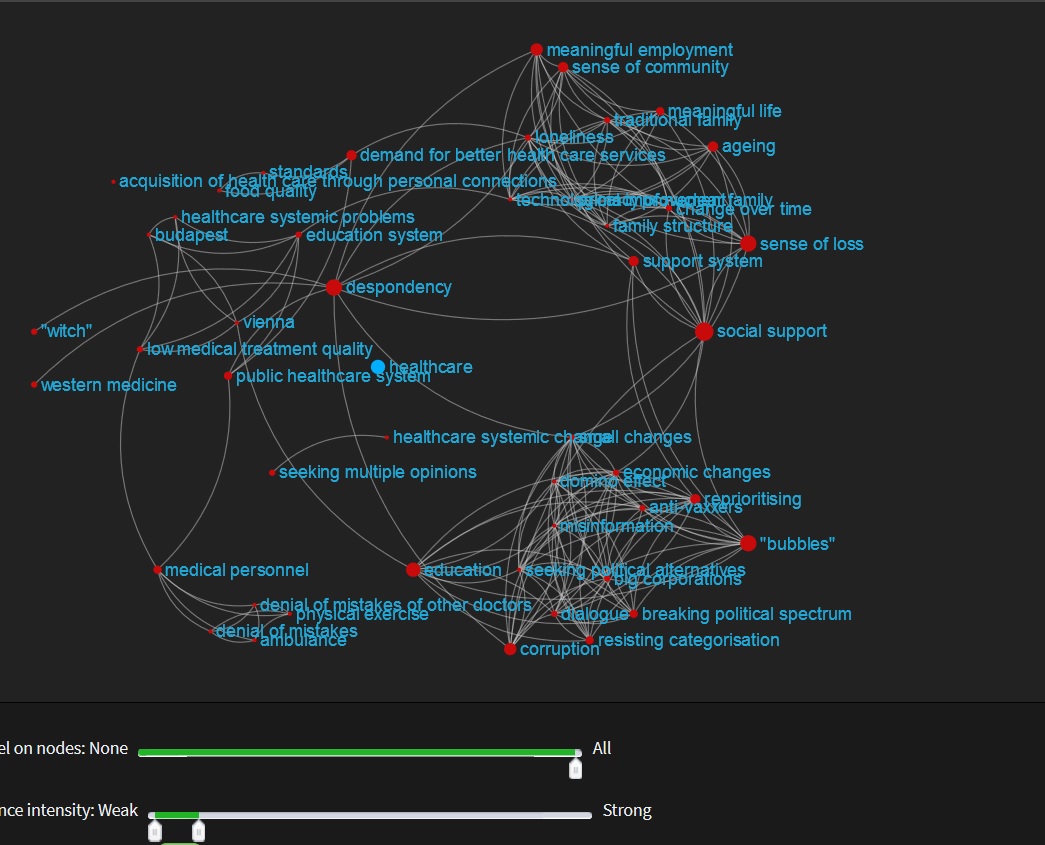As the Czech POPREBEL community has formed in our forum over the last year and generated content which represents it, we had a chance to observe which were the key topics attracting attention and stimulating debate. However, the ethnographic team led by @amelia and including myself, @SZdenek, @Jan and @Wojt has proceeded simultaneously with the coding of the material on our platform. This process should provide insight into how all of the POPREBEL communities, clustered around their respective languages of communication see the issues that our project seeks to understand. This brief report attempts to present findings relevant to the Czech forum, which were…
BIG Topics
It was only logical that the first major matter emanating from the forum was the issue of healthcare. It was an opener for our discussion and remained relevant further on, appearing in different contexts. The intensity of the healthcare discussion on the Czech forum resulted in its “branching out” when represented in the GraphRyder with cooccurrence threshold set on k=4 a centred on the overall POPREBEL view:

What generally appears to be a backbone and connection of the healthcare to the POPREBEL is an unsatisfactory treatment that people receive in the Czech public healthcare system, while the expenses in the private sphere are not the only problem of finding an alternative, as the quality of the latter has been put under scrutiny and received ambiguous assessment as well. When centering on healthcare as a node, the picture of adjacent nodes and edges turns out to be the following:

The issues of healthcare seem to spill over to the areas of social relations and structures on one hand and general “grand” issues of the society, be it economical and political. The health care discussion as a whole elucidates two underlying narratives which form a bridge to other areas. First one is a theme of looking for an alternative, a third way of problem-solving, which would not rely on neither public (state-sponsored and thus politically dependant) nor private sphere. The second is both implicit and explicit perception of socially and economically predatory behavioural patterns which transverse different spheres, be it in the healthcare system or politics, combined with lack of will to assume responsibility for one’s deeds.
Both of these narratives framed the second major topic, the discussion about housing. The situation in Czechia has indeed become dire, especially for those living in big cities. A brief look at the term housing provides an overview of major concerns, be it lack of solutions provided by both the public and the private stakeholders and illustrates the necessity of personal agency leading to desperation from the impossibility of the situation produced by inadequate conditions:

It is interesting though, to observe the direct connection of the housing issues to the third major theme, environmental problems and topics of climate change. Very fluently, the housing problems became a part of a framework which could be called an “ecology of life”, a way of thinking about the spatiality and quality of one’s living in Czechia in rather global terms.
Where to next?
It seems that the current situation is, unfortunately, presenting us with an opportunity to agglomerate the aforementioned tpics around the current COVID-19 outbreak. The recent experiences have definitely shifted the attention of the Czech society toward the healthcare system and what more, the current government has not seldomly come into conflict with those, who actually work in the healthcare system, One can feel that there is an uncertainity shared by those who provide the services and the clients of how it will hold facing the second wave, which is raging throughout the population as of now.
Furthemore COVID has drastically change the way we lead our lives, repeated lockdowns have pushed us into our dwellings. As for some, it might be quite relaxed expereinces, for many, who share their aparmtents, have to take care of their children or were sent by the Unievrsities back to their parents’ homes, it represents the exact opposite.
Furthermore, COVID has overshadowed the issues of sustainabilty and environmental care, but these were not magically resolved, the persist and with the economy probably coming through a shock during the next, there might an opening for accepting a new normality, which will inculde a mindset more careful about how and in which way we as individuals and our society perpetrate the current production-consumption pattern.
How to get there?
To summarize all that was said above,w e propose the following themes to be taken into consideration when discussing the future development of our community all in reference to the COVID:
- gender , via work patterns, educaiton, leisure time, and a division of labour that is having to be negotiated/brings existing disparities to the fore, as childcare falls upon women much more.
- housing , including intergenerational relations
- healthcare - access and inequality, reflections on the system and its relation to politics
- anti-LGBT sentiment and relationship to ethnic minorities and refugees - via scapegoating, etc. can also approach this via anti-intellectualism — particularly in the covid setting, around relationships to covid (e.g. is it a government/elite play for power or a legitimate public health issue)
We beleive the resulting discussion will be productive and enlightening.